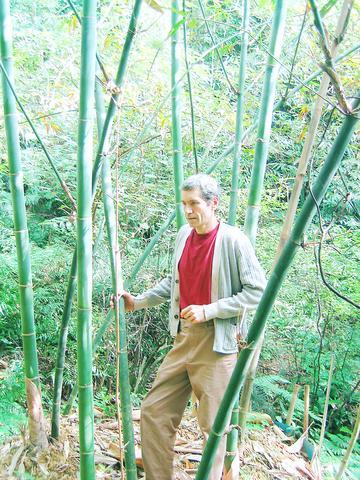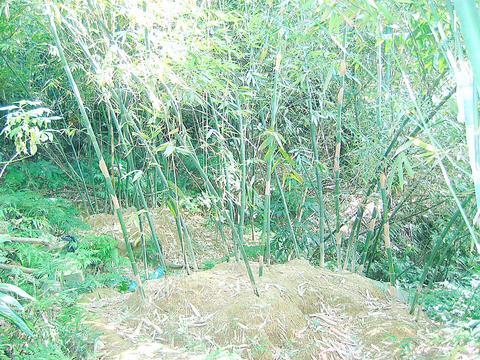Expat and International Primate Protection League representative John Spowart got more then he bargained for last weekend when his amiable afternoon saunter through the woods close to his home at the foot of Taipei's popular forest park, Four Beasts Mountain (四獸山), turned into confrontation with illegal bamboo farmers.
Having lived in the Sungshan District (松山區) adjacent to the park for almost five years, Spowart has witnessed a steady rise in the number of illegal bamboo plots in the area. Groves the size of basketball courts have replaced large tracts of land that were once rich in flora. It was only last weekend, however, that Spowart had come face to face with a couple of the perpetrators.

PHOTO: GAVIN PHIPPS, TAIPEI TIMES
The British national's polite inquiries in regards the legality of felling trees and clearing large tracts of land in the area he knew to be part of the Taipei City Government-administered park were initially met by a flurry of insults followed by something along the line of, "What's it got to do with you?"

"They were annoyed at my presence and figured it was none of my business. But as I pointed out to them, I was on a public footpath and it was in fact them who had no business being there felling trees and planting bamboo," Spowart said. "It all got a bit heated. I kept asking them about their rights to plant bamboo here. Of course, they didn't have answers to this. I went to call the park authorities and they buggered off."
Along with betel nut palms, bamboo can be one of the most destructive of the harvested plants found in Taiwan. The root system releases toxins into the surrounding earth that kills anything attempting to grow and its canopy denies other flora the sunlight it needs to continue to thrive. One 2m bamboo plant can effectively destroy an area of 1.5m2 of land.
"People plant it because they know it doesn't need tending and grows quickly. It's a relatively easy cash crop to grow and one that is popular with people who have access to land and are looking to make extra money," said Hu Jer-ming (胡哲明), assistant professor at the National Taiwan University Department of Botany. "The effects of bamboo on the natural environment aren't as widely publicized as that of betel nut palms, but it is just as devastating."
"It's a big problem in the Taipei area. They [illegal farmers] figure that because the land is empty and not used by anybody that they can use it for their own needs," said Tsao Fu-chung (曹福忠) of the Taipei City Government's Department of Economic Development (台北市政府建設局). "We get dozens of calls every years from people like Spowart who discover illegal farms on land in Taipei. Of course, many more people ignore it, which is a pity as this only leads to more land being enveloped by the `farmers.'"
The problem of illegal bamboo groves within Taipei City's environs is not limited to Four Beasts Mountain. The problem is endemic on Yangmingshan (陽明山), especially in the Peitou area as well as in the areas around Neishungxi (內雙溪). Because of the large areas of land involved it is impossible for people such as Tsao to adequately monitor the area without public support.
As part of its ongoing environmental awareness programs, Taipei City Government's Department of Economic Development encourages people who discover illegal farms on government and public land to inform them. But though the city government sends a team of land specialists to every site where illegal farming is reported and erects signs informing would-be farmers of the illegality of using the land to cultivate crops, few of the unlawful farmers are prosecuted. Catching the unscrupulous cultivators in the act rarely, if ever happens according to the Council of Agriculture (行政院農業委員會).
"On a national scale the problem of illegal farming in Taipei is pretty small, yet it's still damaging," said a spokesperson for the Council of Agriculture. "A lot of the illegal farming takes place at night. These guys know that no one will bother them then. Even if people do stumble across them very few bother tell the authorities."
At present those caught cultivating crops illegally face a maximum fine of NT$600,000, or from between six months and five years imprisonment. While the city government program is proving moderately successful, many feel the number of calls needs to increase drastically if the problem is to be dealt with on a scale that will make a difference and deter would-be illegal bamboo farmers. Until then, however, it looks as if environmentalists such as Spowart are facing an uphill battle.
"The hills around Taipei are beautiful and have a pretty high density of species, which is good news for all of us. But if profit- motivated individuals are allowed to destroy it the impact will be felt right across the board," Spowart said. "I hope the city government can do something to enforce its own laws. It needs regular monitoring and a lot more citizen involvement."

Dissident artist Ai Weiwei’s (艾未未) famous return to the People’s Republic of China (PRC) has been overshadowed by the astonishing news of the latest arrests of senior military figures for “corruption,” but it is an interesting piece of news in its own right, though more for what Ai does not understand than for what he does. Ai simply lacks the reflective understanding that the loneliness and isolation he imagines are “European” are simply the joys of life as an expat. That goes both ways: “I love Taiwan!” say many still wet-behind-the-ears expats here, not realizing what they love is being an

William Liu (劉家君) moved to Kaohsiung from Nantou to live with his boyfriend Reg Hong (洪嘉佑). “In Nantou, people do not support gay rights at all and never even talk about it. Living here made me optimistic and made me realize how much I can express myself,” Liu tells the Taipei Times. Hong and his friend Cony Hsieh (謝昀希) are both active in several LGBT groups and organizations in Kaohsiung. They were among the people behind the city’s 16th Pride event in November last year, which gathered over 35,000 people. Along with others, they clearly see Kaohsiung as the nexus of LGBT rights.

In the American west, “it is said, water flows upwards towards money,” wrote Marc Reisner in one of the most compelling books on public policy ever written, Cadillac Desert. As Americans failed to overcome the West’s water scarcity with hard work and private capital, the Federal government came to the rescue. As Reisner describes: “the American West quietly became the first and most durable example of the modern welfare state.” In Taiwan, the money toward which water flows upwards is the high tech industry, particularly the chip powerhouse Taiwan Semiconductor Manufacturing Co (TSMC, 台積電). Typically articles on TSMC’s water demand

Every now and then, even hardcore hikers like to sleep in, leave the heavy gear at home and just enjoy a relaxed half-day stroll in the mountains: no cold, no steep uphills, no pressure to walk a certain distance in a day. In the winter, the mild climate and lower elevations of the forests in Taiwan’s far south offer a number of easy escapes like this. A prime example is the river above Mudan Reservoir (牡丹水庫): with shallow water, gentle current, abundant wildlife and a complete lack of tourists, this walk is accessible to nearly everyone but still feels quite remote.